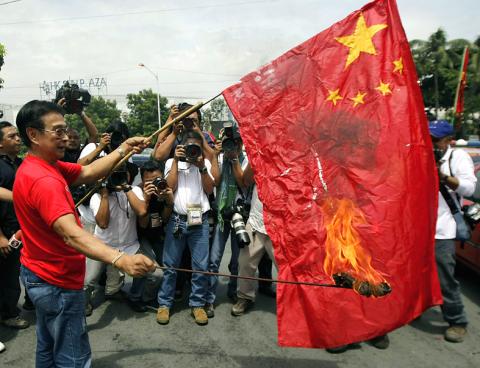The Philippines has taken China to a UN tribunal to challenge its claim to most of the South China Sea, including territory belonging to the archipelago, Philippine Secretary of Foreign Affairs Albert del Rosario said yesterday.
Del Rosario told reporters that Manila had referred Beijing to an arbitration panel under the UN Convention on the Law of the Sea (UNCLOS) — a 1982 treaty signed by both countries — and would ask it to declare Chinese claims in the area invalid.
“The Philippines has exhausted almost all political and diplomatic avenues for a peaceful negotiated settlement of its maritime dispute with China,” he said.

Photo: EPA
“On numerous occasions, dating back to 1995, the Philippines has been exchanging views with China to peacefully settle these disputes. To this day, a solution is still elusive,” Del Rosario added. “We hope that the arbitral proceedings shall bring this dispute to a durable solution.”
China’s territorial claims overlap those of the Philippines, as well as Taiwan, Brunei, Malaysia and Vietnam.
Over the past two years the Philippines and Vietnam have complained about China’s increasing assertiveness in enforcing those claims, particularly around areas believed rich in oil and natural gas reserves.
Manila says the Chinese stance led to a standoff last year with the Philippines over rich fishing grounds around the Scarborough Shoal (Huangyan Island, 黃岩島), a formation much closer to the Philippine coast than to China’s shores.
The Philippines in its submission says Beijing’s so-called “nine-dash line” outlining its territorial claims over most of the sea, including waters and islands close to its neighbors, is illegal, according to Del Rosario.
It also demands that China “desist from unlawful activities that violate the sovereign rights and jurisdiction of the Philippines under the 1982 UNCLOS,” he added.
A briefing paper provided by the Philippine foreign department alleged that within the nine-dash line, “China has also laid claim to, occupied and built structures on certain submerged banks, reefs and low-tide elevations that do not qualify as islands under UNCLOS, but are parts of the Philippine continental shelf, or the international seabed.”
China swiftly dismissed the submission, with Chinese Ambassador to the Philippines Ma Keqing (馬克卿) repeating her country’s stance to an official in the Philippines’ foreign office.
“Ambassador Ma reiterated the principled position of the Chinese side, and stressed that China has indisputable sovereignty over the islands in [the] South China Sea and its adjacent waters,” a Chinese embassy statement said.
“The Chinese side strongly holds [that] the disputes on [the] South China Sea should be settled by parties concerned through negotiations,” it added.
UNCLOS generally requires both parties to undergo arbitration and it was unclear if and when the UN would act, given China’s stance. However, a source said there were examples where cases had been heard with only one side present.
Rene de Castro, a political science professor at Manila’s De La Salle University, said the Philippines’ submission was a last throw of the dice and unlikely to force Beijing’s hand.
“I don’t think China will bite the bait. It has been consistent with its position that territorial disputes ought to be solved bilaterally,” De Castro said.
“We have exhausted all our options and we’re scraping the barrel, really,” he added.

MAKING WAVES: China’s maritime militia could become a nontraditional threat in war, clogging up shipping lanes to prevent US or Japanese intervention, a report said About 1,900 Chinese ships flying flags of convenience and fishing vessels that participated in China’s military exercises around Taiwan last month and in January last year have been listed for monitoring, Coast Guard Administration (CGA) Deputy Director-General Hsieh Ching-chin (謝慶欽) said yesterday. Following amendments to the Commercial Port Act (商港法) and the Law of Ships (船舶法) last month, the CGA can designate possible berthing areas or deny ports of call for vessels suspected of loitering around areas where undersea cables can be accessed, Oceans Affairs Council Minister Kuan Bi-ling (管碧玲) said. The list of suspected ships, originally 300, had risen to about

DAREDEVIL: Honnold said it had always been a dream of his to climb Taipei 101, while a Netflix producer said the skyscraper was ‘a real icon of this country’ US climber Alex Honnold yesterday took on Taiwan’s tallest building, becoming the first person to scale Taipei 101 without a rope, harness or safety net. Hundreds of spectators gathered at the base of the 101-story skyscraper to watch Honnold, 40, embark on his daredevil feat, which was also broadcast live on Netflix. Dressed in a red T-shirt and yellow custom-made climbing shoes, Honnold swiftly moved up the southeast face of the glass and steel building. At one point, he stepped onto a platform midway up to wave down at fans and onlookers who were taking photos. People watching from inside

Japan’s strategic alliance with the US would collapse if Tokyo were to turn away from a conflict in Taiwan, Japanese Prime Minister Sanae Takaichi said yesterday, but distanced herself from previous comments that suggested a possible military response in such an event. Takaichi expressed her latest views on a nationally broadcast TV program late on Monday, where an opposition party leader criticized her for igniting tensions with China with the earlier remarks. Ties between Japan and China have sunk to the worst level in years after Takaichi said in November that a hypothetical Chinese attack on Taiwan could bring about a Japanese

The WHO ignored early COVID-19 warnings from Taiwan, US Deputy Secretary of Health and Human Services Jim O’Neill said on Friday, as part of justification for Washington withdrawing from the global health body. US Secretary of State Marco Rubio on Thursday said that the US was pulling out of the UN agency, as it failed to fulfill its responsibilities during the COVID-19 pandemic. The WHO “ignored early COVID warnings from Taiwan in 2019 by pretending Taiwan did not exist, O’Neill wrote on X on Friday, Taiwan time. “It ignored rigorous science and promoted lockdowns.” The US will “continue international coordination on infectious